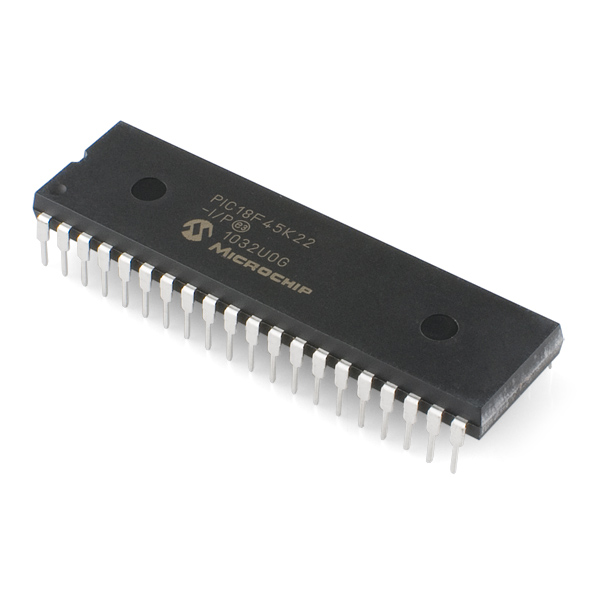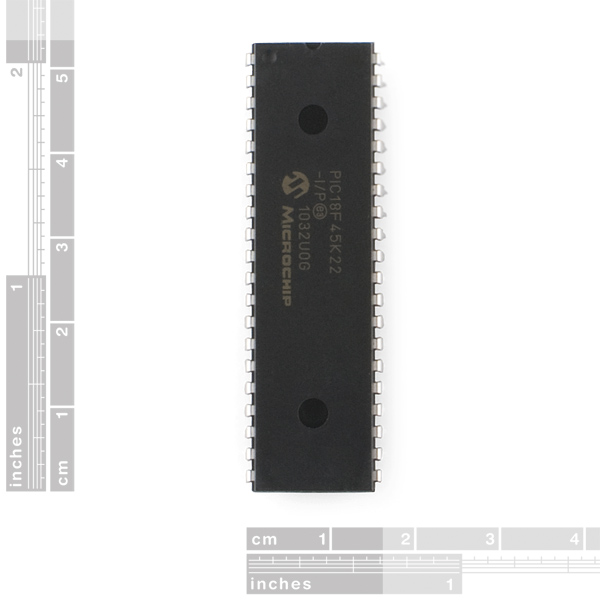PICAXE 40X2 Microcontroller (40 pin)
The PICAXE X2 microcontrollers are the second generation of PICAXE chips; providing more features and greater flexibility. With the PICAXE 40x2, you get four times the memory and a number of additional input and output pins, when compared to the 40x1.
PICAXE is a neat entry-level microcontroller system that is relatively cheap to get started with. The chip is programmed with a simple serial connection and the BASIC development environment is free! PICAXE has some excellent educational applications and support, and is a great entryway into more complicated embedded systems. If you're look for a place to start with microcontrollers, PICAXE is a great way to go!
PICAXE 40X2 Microcontroller (40 pin) Product Help and Resources
Core Skill: Soldering
This skill defines how difficult the soldering is on a particular product. It might be a couple simple solder joints, or require special reflow tools.
Skill Level: Rookie - The number of pins increases, and you will have to determine polarity of components and some of the components might be a bit trickier or close together. You might need solder wick or flux.
See all skill levels
Core Skill: Programming
If a board needs code or communicates somehow, you're going to need to know how to program or interface with it. The programming skill is all about communication and code.
Skill Level: Competent - The toolchain for programming is a bit more complex and will examples may not be explicitly provided for you. You will be required to have a fundamental knowledge of programming and be required to provide your own code. You may need to modify existing libraries or code to work with your specific hardware. Sensor and hardware interfaces will be SPI or I2C.
See all skill levels
Core Skill: Electrical Prototyping
If it requires power, you need to know how much, what all the pins do, and how to hook it up. You may need to reference datasheets, schematics, and know the ins and outs of electronics.
Skill Level: Competent - You will be required to reference a datasheet or schematic to know how to use a component. Your knowledge of a datasheet will only require basic features like power requirements, pinouts, or communications type. Also, you may need a power supply that?s greater than 12V or more than 1A worth of current.
See all skill levels
Comments
Looking for answers to technical questions?
We welcome your comments and suggestions below. However, if you are looking for solutions to technical questions please see our Technical Assistance page.
Customer Reviews
No reviews yet.



hey that photo is a Microchip MCU, not a PICAXE !
The PICAXE system is a interpreter on top of a picMicro.
this chip works at 64 MHz. I have never seen a microchip 8-bit pic running at 64MHz. wtf?
I have a PIC18F45K20 running at 64 mhz, with 33pf load caps. You have to use an external crystal to achieve speeds that high.
Hey, a PICAXE is a PIC MCU! All the ones I have have the PIC mask.
Whaaat? Why are these retired now?? That's dissapointing, I had planned on buying some extras for various projects but didn't have the cash at the time. Oh well, 40x1 it is. For the time being anyway.
I just saw this, too. This sucks! I'll need a couple in the not-too-distant future for a project of mine, and now I don't know where I'll get them :(
Bring this back, please!
I have been trying to figure out if it's being superseded by a new version or if Sparkfun just didn't see the demand for them. So far it just seems like Sparkfun just didn't see the demand for them which is definitely a bummer. I had just used the 40x2 for the first time to address and read data from gameboy carts. It made it so insanely easy with it being in basic and all the simple ways to manipulate bytes and bits. It's just a great universal chip that's easy to use.
Some clarity & questions about this MCU.
External frequency can be set to 64 MHz (MAX) via crystal and capacitors on pins 13 & 14 labelled 'Resonator'.
There are two 'V+' pins. Do they both get connected to Vcc? If so does Vcc need to be divided into the two pins, or is only one required? E.g: 5V divided to 2.5V for pins 11 & 32 or 5V in either pin 11 or 32.
for some size comparison, it's both longer and wider than the 4 digit 7 segment dislpay
Can this be physically oberclocked? Aka.. a new resonator? I think that could be kind of fun to do...:D
Yes, a 16Mhz resonator will get it working at 64Mhz but I think people have used bigger and generated a lot of heat in the process
A 16MHz res will not get this thing running 64MHz; you have to buy an external 64MHz crystal and add the load caps. I run a PIC18F45K20 with the above, 33pf load caps to be exact, and I run around 63MHz on my scope.
It will, the PICAXE has an internal 4x PLL meaning a 4Mhz resonator will get you to 16Mhz and an 8Mhz resonator will get you to 32Mhz.
Have a look at Manual 2 pg221 on setfreq. Remember that the PICAXE is a PIC18F45K22 :)
is this the 3.3v, 5v or universal voltage version?
(edit) just got one and searcher the part no. it is the unviersal voltage version i.e. 1.8-5.5V
I ordered this one and i can say it's huge! Is Sparkfun going to have surface-mount versions? That would be much better than ordering them from the UK.